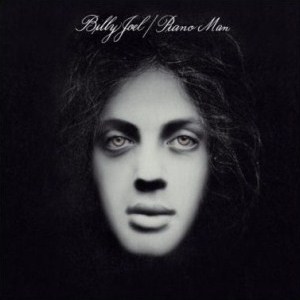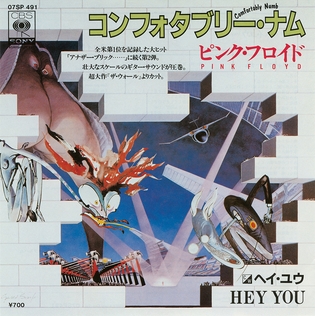
The Wall is the eleventh studio album by the English rock band Pink Floyd, released on 30 November 1979 by Harvest and Columbia Records. It is a rock opera that explores Pink, a jaded rock star whose eventual self-imposed isolation from society forms a figurative wall. The album was a commercial success, topping the US charts for 15 weeks and reaching number three in the UK. It initially received mixed reviews from critics, many of whom found it overblown and pretentious, but later received accolades as one of the greatest albums of all time and one of the band's finest works.

Animals is the tenth studio album by the English rock band Pink Floyd, released on 21 January 1977 through Harvest and Columbia Records. It was recorded at the band's Britannia Row Studios in London throughout 1976, and was produced by the band. The album continues the longform compositions that made up their previous works, including Wish You Were Here (1975). The album received positive reviews from critics and was commercially successful, reaching No. 2 in the UK and No. 3 in the US.

George Roger Waters is an English songwriter, singer, bassist, and composer. In 1965, he co-founded the progressive rock band Pink Floyd. Waters initially served solely as the bassist, but following the departure of singer-songwriter Syd Barrett in 1968, he also became their lyricist, co-lead vocalist, and conceptual leader.

Piano Man is the second studio album by American recording artist Billy Joel, released on November 9, 1973 by Columbia Records. The album emerged from legal difficulties with Joel's former label Family Productions, and ultimately became his first breakthrough album.

Paul Rodgers is a British-Canadian singer, songwriter and multi-instrumentalist. He was the lead vocalist of numerous bands, including Free, Bad Company, The Firm, and The Law. He has also performed as a solo artist, and collaborated with the remaining active members of Queen under the moniker Queen + Paul Rodgers. A poll in Rolling Stone magazine ranked him number 55 on its list of the "100 Greatest Singers of All Time". In 2011 Rodgers received the British Academy's Ivor Novello Award for Outstanding Contribution to British Music.

A Momentary Lapse of Reason is the thirteenth studio album by the English progressive rock band Pink Floyd, released in the UK on 7 September 1987 by EMI and the following day in the US on Columbia. It was recorded primarily on guitarist David Gilmour's converted houseboat, Astoria.

Amused to Death is the third studio album by English musician Roger Waters, released 7 September 1992 on Columbia. Produced by Waters and Patrick Leonard, it is mixed in QSound to enhance its spatial feel. The album features Jeff Beck on lead guitar on several tracks. The album's title was inspired by Neil Postman's 1985 book Amusing Ourselves to Death.

The Pros and Cons of Hitch Hiking is the first solo album by Roger Waters; it was released in 1984, the year before Waters announced his departure from Pink Floyd. The album was certified gold in the United States by the Recording Industry Association of America in April 1995.

"Comfortably Numb" is a song on English rock band Pink Floyd's eleventh album, The Wall (1979). It was released as a single in 1980, with "Hey You" as the B-side. The music was composed by guitarist David Gilmour, and the lyrics were written by bassist Roger Waters.

Radio K.A.O.S. is the second solo studio album by English rock musician Roger Waters. Released on 15 June 1987 in the United Kingdom and June 16 in the United States, it was Waters' first solo album after his formal split from Pink Floyd in 1985. Like his previous and future studio albums and many works of his during his time with Pink Floyd, the album is a concept album based on a number of key topical subjects of the late 1980s, including monetarism and its effect on citizens, popular culture of the time, and the events and consequences of the Cold War. It also makes criticisms of Margaret Thatcher's government, much like Pink Floyd's The Final Cut (1983), another album conceived by Waters.

Jim Ladd, an American disc jockey, radio producer and writer, is one of the few notable remaining freeform rock DJs in United States commercial radio. Ladd first gained national prominence as host of the hour long, nationally syndicated radio program Innerview, which aired weekly on over 160 stations nationwide for twelve years. Ladd has interviewed the likes of John Lennon, Grateful Dead, Pink Floyd, Rush, U2, Joni Mitchell, Stevie Nicks, Crosby, Stills, Nash & Young, Eagles and Led Zeppelin.

The Bridge is the tenth studio album by American singer-songwriter Billy Joel, released on July 9, 1986. It was Joel's last studio album produced by Phil Ramone as well as the last to feature Joel's long-time bassist Doug Stegmeyer and rhythm guitarist Russell Javors. The album yielded several successful singles, including "A Matter of Trust", "Modern Woman", and "This Is the Time".

The Wall – Live in Berlin was a live concert performance by Roger Waters and numerous guest artists, of the Pink Floyd studio album The Wall, itself largely written by Waters during his time with the band. The show was held in Berlin on 21 July 1990, to commemorate the fall of the Berlin Wall eight months earlier. A live album of the concert was released 21 August 1990. A video of the concert was also commercially released.

"The Tide Is Turning " is the closing track from Roger Waters' second studio album, Radio K.A.O.S. It was released as the album's third single, in November 1987. A live version of the song was released as the second single from Waters' debut live album, The Wall – Live in Berlin in November 1990.

The Kent Music Report was a weekly record chart of Australian music singles and albums which was compiled by music enthusiast David Kent from May 1974 through to January 1999. The chart was re-branded the Australian Music Report (AMR) in July 1987. From June 1988, the Australian Recording Industry Association, which had been using the top 50 portion of the report under licence since mid-1983, chose to produce their own listing as the ARIA Charts.

"It's Still Rock and Roll to Me" is a song written and performed by Billy Joel, from the hit album Glass Houses. Released in 1980, the song was number 1 on the Billboard Hot 100 charts for two weeks, from July 19 through August 1, 1980. The song spent 11 weeks in the top 10 of the Billboard Hot 100 and was the 7th biggest hit of 1980 according to American Top 40.
"The Last Farewell" is a song from 1971 by British folk singer Roger Whittaker. Whittaker hosted a radio program in The United Kingdom in 1971, backed by an orchestra with arrangements by Zack Lawrence. Whittaker says "one of the ideas I had was to invite listeners to send their poems or lyrics to me and I would make songs out of them. We got a million replies, and I did one each week for 26 weeks."

Roger Waters's primary instrument is the electric bass guitar. He briefly played a Höfner bass but replaced it with a Rickenbacker RM-1999/4001S, until around 1970 when he switched to Fender Precision basses. He often plays bass using a pick but is also known to play fingerstyle. Not only a bassist and vocalist, Waters has experimented with the EMS Synthi A and VCS 3 synthesisers and has played electric rhythm and acoustic guitars in recordings and in concert. Throughout his career he has used Selmer, WEM, Hiwatt and Ashdown amplifiers, also employing delay, tremolo, chorus, panning and phaser effects in his music.
"Wish You Were Here" is a song by English rock band Pink Floyd. It was released as the title track of their 1975 album of the same name. David Gilmour and Roger Waters collaborated to write the music, and Gilmour sang the lead vocal.

"Sunset Strip" is a song written by Roger Waters for his second studio album, Radio K.A.O.S. It was placed as the fifth track on the record. It was also released as the album's second single, in September 1987.


















